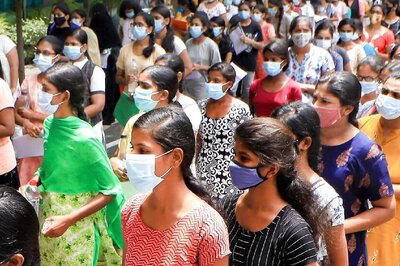
views
When we think of ‘personal growth’, especially in the context of women, we often picture urban, affluent, upwardly mobile women. While these women often have the privilege that allows them to engage in it, personal development and personal growth is, of course, pursued by and open to all. In fact, often, the women who need personal growth the most are the ones who don’t have the privilege of being born into families that are financially stable, of having an education, of being financially or even socially independent.
Often, these are the women who clean streets, public toilets, and sewage systems, and do so in the face of societal prejudice and health hazards. Their work is essential, yet it has long been underappreciated and stigmatised. For these women, personal growth is not a luxury; it’s a necessity. The challenges they face, both within their work and from societal attitudes, can be daunting. Personal growth equips them with the resilience, self-assurance, and determination needed to surmount these challenges.
The Role of HWTC: Beyond Technical Training
As India’s leading brand in the lavatory care space, Harpic has a keen understanding of the problems that sanitation workers face – at work, and outside. This intention is what powered the creation of Harpic World Toilet College (HWTC) in 2016.
HWTC was established with the stated objective of improving the quality of life of sanitation workers through their rehabilitation by linking them with dignified livelihood options. Workers trained by the college are provided placement with various organisations. Following the successful proof of concept in Rishikesh, HWTCs have opened in Maharashtra, Aurangabad, in partnership with Harpic, Jagran Pehel and Maharashtra Government.
Harpic World Toilet College is not just about teaching sanitation techniques; it’s about fostering holistic growth. The curriculum is designed to actively contribute to the personal growth and development of women sanitation workers.
Health and Well-being: For most of us, the starting point of personal growth is physical and mental health. HWTC’s programs emphasise health and safety, ensuring that these women have the knowledge and resources needed to protect themselves from the health hazards that can accompany their work.
Empowering Through Education: Knowledge at HWTC goes beyond sanitation to encompass their rights, health, and personal development. At HWTC, these women often have a chance to learn from their peers who are alumni, and can show them, by example, the possibilities that are now open to them. This empowers them to make informed decisions that improve their lives and futures.
Confidence Building: Confidence is often the first casualty in the face of societal stigma and discrimination. By empowering them through education, training and a curriculum designed to build back their confidence and pride, HWTC turns out sanitation workers who understand their worth, and cannot be pushed around by indiscriminate and exploitative employers.
Soft Skills: HWTC hones their communication, leadership, and problem-solving abilities, enabling them to navigate their roles with grace and assertiveness. For many graduates, this set of skills has helped them rise to supervisory and leadership positions at their new workplaces. For some, it has opened doors to advocacy and activism.
Stories of Transformation
The personal growth experienced by women sanitation workers through institutions like HWTC isn’t something that lives on paper; it is tangible, and often, life-changing. Here are a few stories that exemplify this transformation.
Vandana’s Journey to Empowerment
Vandana, at 32 years old, had resigned herself to a life of limited opportunities. She worked as a toilet cleaner at a local police station after leaving her studies due to financial constraints. Training at HWTC changed her life’s trajectory by both enhancing her technical skills and by building her confidence.
Today, Vandana isn’t just a sanitation worker; she is in charge of counselling for family violence-related cases at the same police station. Her brother, inspired by her journey, completed his Master’s in Social Work. Vandana’s story is a testament to the transformative power of education and personal growth, and the ripple effect that one person’s growth can have.
Rani Devi’s Triumph Over Adversity
When Rani Devi’s husband left, she went from being a domestic helper to working as a sanitation worker. However, her connection with UNFPA and subsequent training at HWTC changed the course of her life.
Under Rani’s leadership, a women’s mechanised cleaning cooperative was formed. They now work with pride and dignity in Patna city, cleaning sewers and drains with machines, reducing the risk to human lives. Rani Devi’s story showcases not only personal growth but also resilience in the face of adversity. Once again, her growth led to growth for several of her peers.
The Bigger Picture: Empowered Women, Transformed Communities
The personal growth of women sanitation workers extends beyond individual empowerment; it ripples through their communities. When these women gain confidence and skills, they become agents of change.
Empowered women sanitation workers advocate for better hygiene practices within their communities. Their knowledge has proved to be invaluable in rural areas where awareness about sanitation is low. When these women learn about the risks associated with their work and how to mitigate them, they take steps to protect themselves, and the communities that rely on them, leading to improved overall health.
When these women earn more and have better job prospects, it benefits their families, their peers and their communities. The economic upliftment resulting from this personal growth can have a profound impact on the well-being of their households. These women inspire others to rethink societal gender norms, breaking down barriers that have persisted for generations.
For Harpic, the establishment of HWTC is just one part of the larger program to build awareness around toilet access, toilet hygiene, and the upliftment of the sanitation workers who form the backbone of our sanitation efforts. Three years ago, Harpic joined hands with News18 to create Mission Swachhta aur Paani, a movement that champions the cause of inclusive sanitation, equality for all genders, abilities, castes and classes and the strong belief that clean toilets are a shared responsibility.
Mission Swachhta aur Paani is using its platform to spark necessary conversations and find realistic solutions to these problems through dialogue between key stakeholders. It is also raising awareness, and educating the larger public about these key issues that affect all of us. This article is part of it, as are hundreds others that shed light on various aspects of the sanitation work that lies ahead.
What we talk about matters. Conversations spark action. Add your unique voice to this conversation, and do your bit to steer us towards a Swasth and Swachh Bharat, here.




















Comments
0 comment